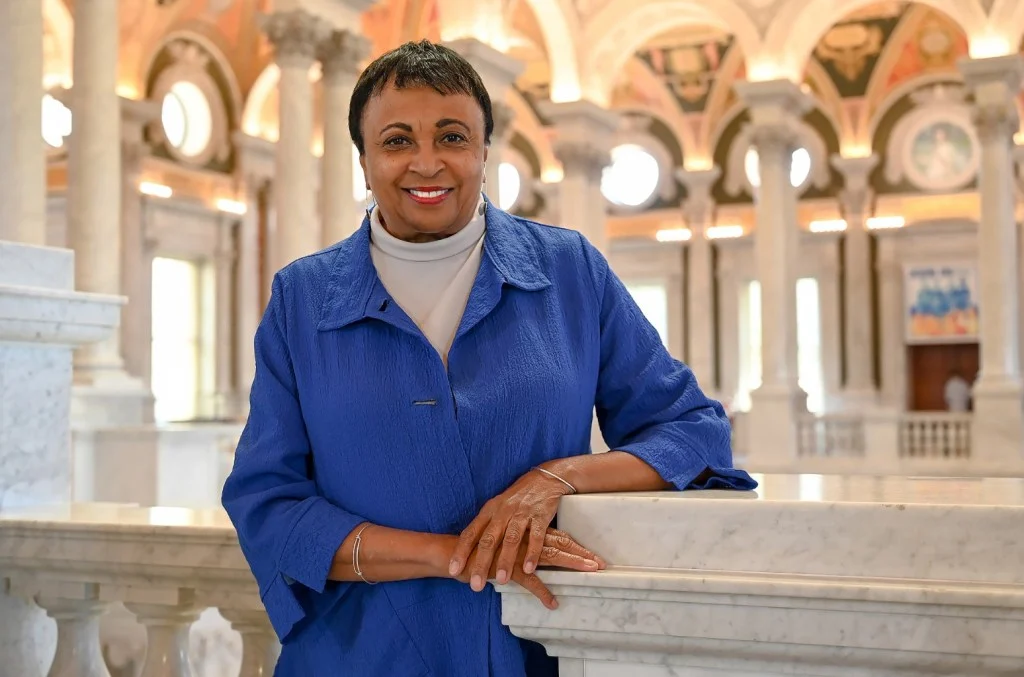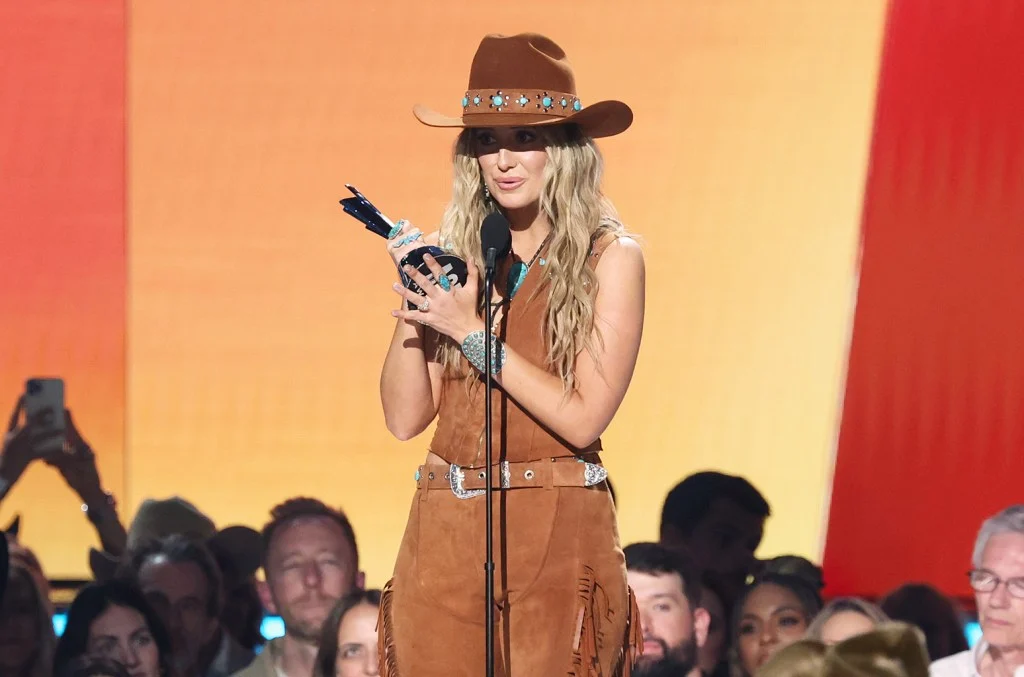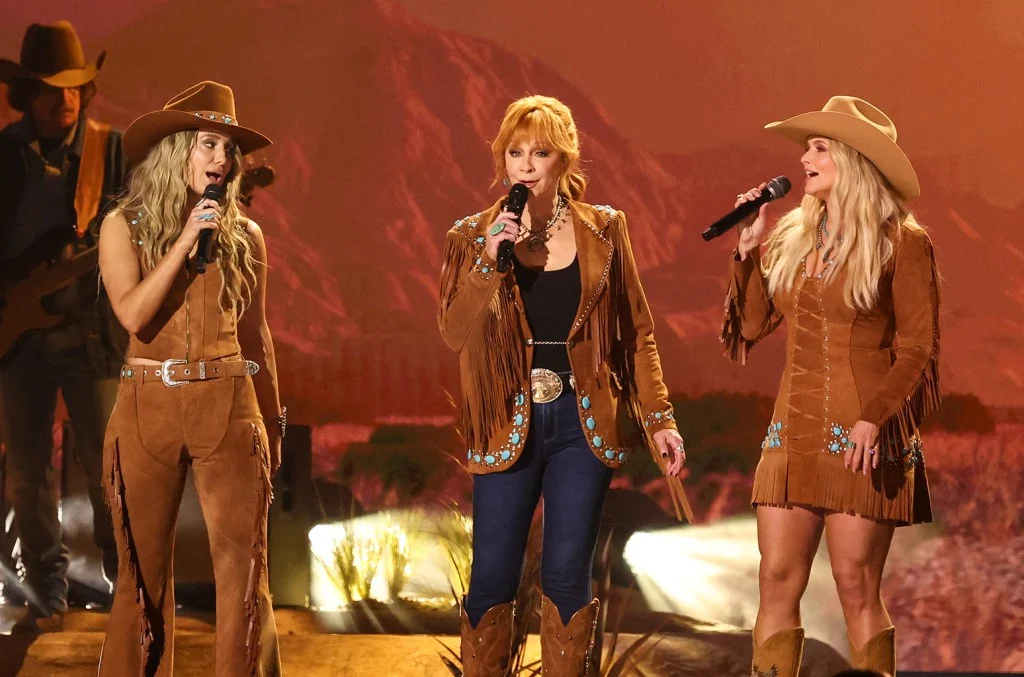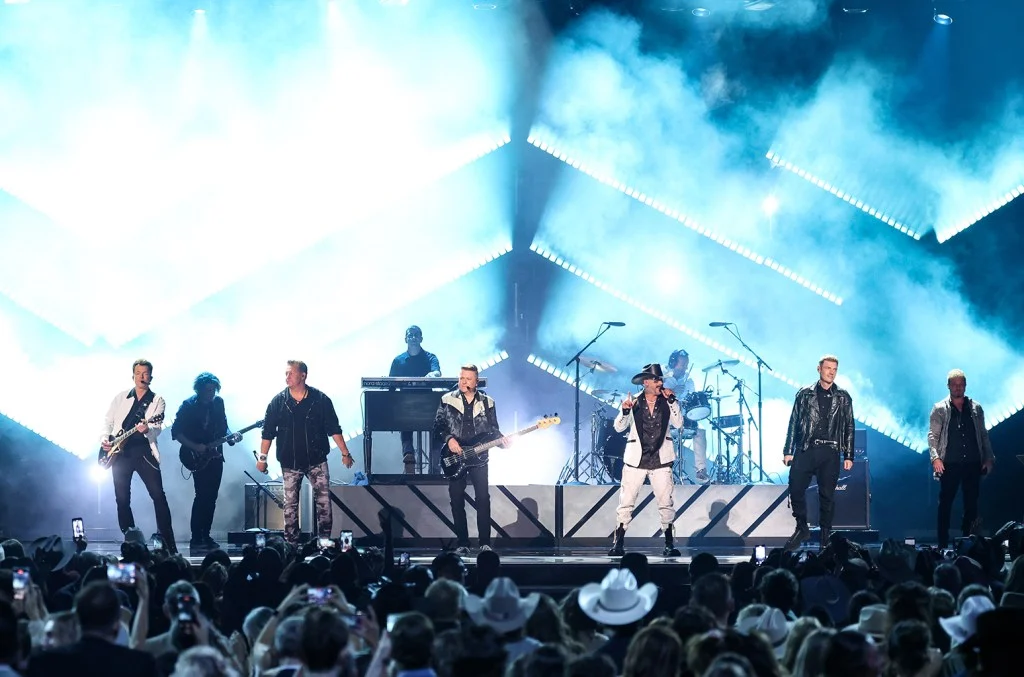Awards
Page: 28
The ACM Awards will return to Prime Video next year.
The Academy of Country Music and ACM Awards producer Dick Clark Productions (DCP) has struck a deal with Prime Video for the return of the show on the service for the next three years, which will take it through its 63rd ceremony in 2028.
The news follows the ACM Awards’ 60th anniversary show, which streamed live on Amazon’s Prime Video on May 8 from the Ford Center at the Star in Frisco, Texas. The show also streamed live for an international audience across more than 240 countries and territories, exclusively on Prime Video and Amazon Music’s channel on Twitch.
During this year’s ceremony, Lainey Wilson took home the night’s top honor of entertainer of the year (marking her second consecutive win in the category), as well as female artist of the year, songwriter-artist of the year and album of the year (for Whirlwind). Ella Langley earned the most trophies of the evening with five wins, followed by Wilson with four wins. Alan Jackson was the recipient of the inaugural ACM Lifetime Achievement Award, while Keith Urban was honored with the ACM Triple Crown Award.
“Our ongoing partnership with the Academy of Country Music and Dick Clark Productions has been an amazing experience for everyone involved,” said Vernon Sanders, global head of television at Amazon MGM Studios, in a statement. “With the tremendous success of this year’s 60th anniversary show hosted by the legendary Reba McEntire, we are overjoyed to continue our relationship with the Academy and DCP for the next three years. We look forward to maintaining this success and bringing even more star-studded and captivating shows to our global Prime Video customers.”
Trending on Billboard
“Our powerful partnership with Amazon MGM Studios and Prime Video has expanded the reach and accessibility of our show and the country music genre to viewers anytime, anywhere around the world and has redefined what an awards show experience can and should be in today’s environment,” said Damon Whiteside, CEO of the Academy of Country Music, in a statement. “The synergies between Prime Video, Amazon Music, Twitch, and the other divisions of Amazon bring exponential value to our artists, our genre, and our fans through an immersive 360 music experience they can’t get from any other platform. I am so proud of our pioneering first four years in the streaming space, and we are excited to continue to deliver the future of country music and the ACM Awards to fans everywhere over the next three years.”
“We’re thrilled to continue our partnership with Prime Video through 2028,” added Jay Penske, CEO of Dick Clark Productions. “The Academy of Country Music Awards made history in 2022 as the first major awards show to exclusively livestream and continues to break new ground, creating a world-class music event and providing dynamic, unparalleled reach through Prime Video, connecting country music with a global audience.”
“I feel like it’s just another way for us to get country music out there to the world,” added the Academy of Country Music’s winningest artist of all time, Miranda Lambert, of the partnership between the ACM Awards and Prime Video. “Country music is really popular right now, and I’m so glad more people are understanding what we’re about, and I’m so happy to be part of the ACM history, and that it’s gonna continue for three more years is really exciting.”
The 60th Academy of Country Music Awards was produced by DCP, with Raj Kapoor serving as executive producer and showrunner and Patrick Menton serving as co-executive producer. Whiteside served as executive producer for the Academy of Country Music, while Penske and Barry Adelman served as executive producers for DCP, with John Saade working as consulting producer for Amazon MGM Studios.
The ACM Awards are produced by Dick Clark Productions, which is owned by Penske Media Eldridge, a joint venture between Eldridge Industries and Billboard parent company Penske Media.
Latin music superstar (and anime collaborator) J Balvin, country singer/songwriter Kacey Musgraves and screenwriter Zak Penn are set to present at the 2025 Crunchyroll Anime Awards, which will be held at the Grand Prince Hotel Shin Takanawa in Tokyo on Sunday, May 25.
These bookings demonstrate the increasing global reach of anime. J Balvin is from Colombia; Musgraves and Penn are both American. Previously announced presenters, who also underscore the form’s global appeal, include Italian rocker Damiano David, Japanese and British musician-actor Rina Sawayama, Brazilian pop star Pabllo Vittar, Japanese actor-musician Dean Fujioka and American-Chilean singer Paloma Mami.
Trending on Billboard
Penn’s screenwriting credits include The Incredible Hulk, X2, X-Men: The Last Stand and The Avengers.
In addition, Japanese singer-songwriter LiSA, rock band FLOW and hip-hop duo Creepy Nuts are set to perform.
FLOW, the rock band featured in the openings for Naruto and Code Geass, will perform “DAYS” in celebration of the 20th anniversary of Eureka Seven. LiSA is the singer of Demon Slayer: Kimetsu no Yaiba’s opening theme “Gurenge.” Creepy Nuts is the 2025 Anime Award nominated hip-hop duo behind the viral hits “Otonoke” and “Bling-Bang-Bang-Born,” which are the opening themes for Dan Da Dan and Mashle: Magic and Muscles, respectively.
The live ceremony will be hosted by voice actress Sally Amaki and entertainer Jon Kabira. Beginning with the pre-show at 5:00 p.m. JST and main show at 6:00 p.m. JST, the livestream will be available for global tune-in on Crunchyroll’s Twitch and YouTube channels as well as SONY PICTURES CORE and the Sony Group Corp Global YouTube Channel. The 2025 Crunchyroll Anime Awards will be available in nine languages.
The main show will be available in Japanese on SONY PICTURES CORE and the Sony Group Corp Japan YouTube Channel for viewing in Japan from 6:00 p.m. JST.
More than 51 million votes have been cast from fans across the globe for the 2025 Crunchyroll Anime Awards, according to the organizers, marking a nearly 50% increase over last year’s 34 million. The Crunchyroll Anime Awards is a yearly awards program honoring the creators, musicians and performances powering the global love of anime. Sony Music Solutions Inc., part of Sony Music Entertainment (Japan) Inc., and Dempsey Productions will support Crunchyroll in the execution of the event.
Crunchyroll, LLC is an independently operated joint venture between U.S.-based Sony Pictures Entertainment and Japan’s Aniplex, a subsidiary of Sony Music Entertainment (Japan) Inc., both subsidiaries of Tokyo-based Sony Group.
More information can be found on the Crunchyroll Anime Awards official website.

President Trump fired Librarian of Congress Carla Hayden on Thursday (May 8) as the White House continues to purge the federal government of those it sees as opposed to the president and his agenda.
Hayden was notified of her dismissal in a curt email from the Presidential Personnel Office.
“Carla,” the email began. “On behalf of President Donald J. Trump, I am writing to inform you that your position as the Librarian of Congress is terminated effective immediately. Thank you for your service.”
Hayden had been appointed to the post by President Obama in 2016 and had been confirmed by the Senate. She was the first woman and the first African American to serve in that post. Her 10-year term was set to expire next year.
Trending on Billboard
Hayden’s firing angered congressional Democrats. “Enough is enough,” said Senate Democratic Leader Charles E. Schumer of New York, who called Hayden “a “trailblazer, a scholar, and a public servant of the highest order.”
House Minority Leader Hakeem Jeffries (D-N.Y.) also blasted the firing. “Donald Trump’s unjust decision to fire Dr. Hayden in an email sent by a random political hack is a disgrace and the latest in his ongoing effort to ban books, whitewash American history and turn back the clock,” Jeffries said.
Robert Newlen, the principal deputy librarian, said he would serve as acting librarian of Congress “until further instruction. I promise to keep everyone informed,” he wrote to colleagues.
In February, Trump fired Deborah F. Rutter as president of the John F. Kennedy Center for the Performing Arts, following his announcement that he was elected as Kennedy Center chair. Rutter had served in that position since 2014.
The Library of Congress is the world’s largest library, home to more than 10 million collection items. The library says its holdings constitute “the creative record of the United States.” It acquires, preserves and provides access to the world’s largest collection of films, television programs, radio broadcasts and sound recordings. It also has collections of rare books, prints and photographs, as well valuable artifacts, such as a flute owned by President James Madison, which Lizzo played in a widely-publicized (and, in some quarters, controversial) 2022 performance arranged by Hayden. The library is the main research arm of the U.S. Congress and the home of the U.S. Copyright Office.
The Librarian of Congress oversees two high-profile awards — the National Recording Registry and the Gershwin Prize for Popular Song. The National Recording Registry, which dates to 2001, vies with the Recording Academy’s Grammy Hall of Fame as the most prestigious institutional award for classic recordings. Established in 2007, the Gershwin Prize honors living musical artists for exceptional contributions in the field of popular song.
The Library calls the Gershwin Prize “the nation’s highest award for influence, impact and achievement in popular music.” The Rock & Roll Hall of Fame, the Songwriters Hall of Fame and the Recording Academy might argue with that, but it has definitely become one of the most prestigious awards — and relatively quickly.
The most recent class of National Registry inductees was announced on April 9. The Library has not yet announced the 2025 recipient of the Gershwin Prize. Elton John and Bernie Taupin were announced as the 2024 recipients on Jan. 30, 2024.
Gershwin Prize honorees during Hayden’s tenure were Smokey Robinson (2016), Tony Bennett (2017), Gloria & Emilio Estefan (2019), Garth Brooks (2020), Lionel Richie (2022), Joni Mitchell (2023) and John & Taupin. Criteria for selection include artistic merit; influence in promoting music as a vehicle of cultural understanding; impact and achievement in entertaining and informing audiences; and inspiring new generations of musicians.
According to the Library of Congress site: “The [Gershwin Prize] honoree is selected by the Librarian of Congress in consultation with a board of scholars, producers, performers, songwriters and music specialists.”
The Librarian of Congress also takes the lead role in selecting the 25 titles each year that are inducted into the National Recording Registry. According to the site: “Under the terms of the National Recording Preservation Act of 2000, the Librarian of Congress, with advice from the National Recording Preservation Board, selects 25 titles each year that are “culturally, historically, or aesthetically significant” and are at least 10 years old.”
In announcing what turn out to be the final batch of National Recording Registry inductions under her tenure, Hayden said: “These are the sounds of America — our wide-ranging history and culture. The National Recording Registry is our evolving nation’s playlist.”
Susanna Hoffs, Muni Long and more have been added to the lineup for the 2025 Grammy Hall of Fame gala, presented jointly by the Recording Academy and Grammy Museum. The event is set for Friday (May 16) at the Beverly Hilton in Beverly Hills, Calif. – the site of the first Grammy Awards ceremony in 1959.
Performances will pay tribute to the 2025 Grammy Hall of Fame inducted recordings, which were announced on Feb. 13.
Trending on Billboard
Susanna Hoffs of The Bangles will perform Cat Stevens’ “Wild World” from the singer-songwriter’s 1970 album Tea for the Tillerman. Emmylou Harris, her producer Daniel Lanois, and jazz drummer Brian Blade will perform selections from Harris’ 1995 album Wrecking Ball. Leslie Odom Jr. will perform the title track from Luther Vandross’ 1981 album, Never Too Much, and Ledisi will perform Clara Ward’s 1951 song “How I Got Over.”
Latin Grammy nominee Leslie Grace will deliver Miami Sound Machine’s 1985 breakthrough hit, “Conga.” Percussionist Cindy Blackman and guitarist Orianthi, joined by longtime Santana band member Andy Vargas, will perform Santana’s “Smooth” from the band’s 1999 album Supernatural; Blackman is married to Carlos Santana.
Eddie Floyd and Jody Stephens, drummer of iconic power-pop band Big Star will perform Floyd’s 1966 hit “Knock on Wood.” Stephens is also expected to perform a track from Big Star’s 1972 album #1 Record. The other five 2025 Grammy Hall of Fame inducted recordings are: J.D. Crowe & The New South’s J.D. Crowe & The New South; Jay-Z’s Reasonable Doubt; Fela Kuti & Afrika 70’s Zombie; Linda Martell’s “Color Him Father”;and Geeshie Wiley’s “Last Kind Words Blues.”
In addition, John Mellencamp, Conan Gray and Long will perform as part of a tribute to this year’s label honoree, Republic Records. Atlantic Records was the initial label honoree at last year’s gala, which marked the first time there was a stand-alone event to honor the inducted recordings. Last year’s gala was held at the Novo Theatre at L.A. Live.
Jon Batiste, the inaugural recipient of the Ray Charles Architect of Sound Award, will also perform. This new annual honor, created in partnership with The Ray Charles Foundation, recognizes an artist whose creative legacy reflects the visionary innovation of Ray Charles.
Returning as host is CBS News journalist Anthony Mason. The show will again be produced by Ken Ehrlich, alongside Ron Basile, Lindsay Saunders Carl and Lynne Sheridan. Ehrlich produced or executive produced the annual Grammy Awards telecast for 40 years. Cheche Alara, a Grammy and Latin Grammy Award-winning composer, producer and conductor, will serve as musical director for the event.
This year’s additions to the Grammy Hall of Fame meet the main requirements – they exhibit “qualitative or historical significance” and are at least 25 years old. Eligible artist(s), producer(s), engineer(s), and mixer(s) of these 13 recordings will receive a certificate from the Recording Academy.
The Grammy Hall of Fame was established by the Recording Academy’s national trustees in 1973. Inducted recordings are selected annually by a member committee drawn from all branches of the recording arts with final ratification by the academy’s national board of trustees. Counting these 13 new titles, the Grammy Hall of Fame totals 1,165 inducted recordings. The full list of past inducted recordings can be found here.
The Grammy Hall of Fame Gala serves as a fundraiser to support the Grammy Museum’s national education programs. It includes a cocktail reception, dinner, and concert program. Tickets are on sale now. Individual tickets are $1,250. For more information, visit this site.
An online auction is currently underway, featuring a collection of guitars signed by such artists as Chappell Roan, Charli xcx, Chris Martin, Sabrina Carpenter, and Lady Gaga & Bruno Mars. They are also auctioning off platinum tickets to the 68th Grammy Awards and more. Proceeds will benefit the Grammy Museum’s education programs. For more information, visit this site.
The Academy of Country Music Awards celebrated a major milestone with this year’s ceremony, commemorating 60 years of feting many of the top performers and artists in country music. Held Thursday night (May 8) and livestreamed on Amazon Prime Video, the ACM Awards featured performances that highlighted six decades of enduring hits, as well as […]
Even before the ACM Awards got underway Thursday (May 8), winners had been announced in six categories. And in one of those categories, the voters delivered a big surprise. Country traditionalist Zach Top took the award for new male artist of the year, beating Shaboozey, whose “A Bar Song (Tipsy)” had spent 19 weeks at […]
Lainey Wilson and Ella Langley were the big winners at the 2025 ACM Awards, which were held on Thursday (May 8) at Ford Center at The Star in Frisco, Texas. Wilson won four awards, including entertainer of the year and album of the year. Langley won five, including four for “you look like you love me,” her flirty duet with Riley Green.
Wilson won entertainer of the year for the second year in a row. She’s the first person to win back-to-back awards in that top category since Jason Aldean scored a threepeat from 2016-18. She’s the first woman to win back-to-back awards for entertainer of the year since Taylor Swift achieved the feat in 2009-10.
Trending on Billboard
Wilson also won album of the year for Whirlwind. She had also won for her previous studio album, Bell Bottom Country. She’s the seventh artist in ACM history to win for back-to-back studio albums (whether they won the awards in consecutive years or not). Miranda Lambert won with five consecutive studio albums. Chris Stapleton won with two consecutive studio albums – and he did that twice. Winning with two consecutive studio albums once were Alabama, Alan Jackson, George Strait and The Chicks.
Wilson won female artist of the year for the third year in a row. She’s the first artist to achieve that feat since Lambert won nine years in a row from 2010-18. Wilson’s fourth award was for artist-songwriter of the year.
Langley and Green won in three categories for their hit “you look like you love me.” The duet won single of the year, music event of the year and visual media of the year. (Langley won two awards in the visual media category, as both artist and one of the directors.) Oddly, they didn’t perform the song on the show, perhaps because they performed it on the CMA Awards in November. Langley’s fifth award on the night was new female artist of the year.
Hosted by Reba McEntire, the ACM Awards streamed live on Prime Video and the Amazon Music channel on Twitch.
Here are other acts that made history at the ACM Awards:
Old Dominion won group of the year for the eighth year in a row, which allowed them to break out of a tie with Rascal Flatts for the most wins in the history of that category. By coincidence, Rascal Flatts was among the nominees this year. Old Dominion’s eight-year winning streak is the longest in any category since Lambert won female artist of the year nine years in a row from 2010-18.
Brooks & Dunn won duo of the year for the first time since 2010. The award had gone back and forth between Dan + Shay and Brothers Osborne for the past eight years. This extends Brooks & Dunn’s record number of wins in this category to 17. Brooks & Dunn won duo of the year at last year’s CMA Awards, setting the stage for this win.
Chris Stapleton won male artist of the year for the fifth time, which puts him in a four-way tie with Merle Haggard, George Strait and Brad Paisley for the most wins in the history of the category.
“Dirt Cheap,” written by Josh Phillips and recorded by Cody Johnson, won song of the year. It’s the first song written by a solitary songwriter to win since Jennifer Nettles won for “Stay” in 2008. Just one other song written by just one writer has won since 2000: Alan Jackson’s “Where Were You (When the World Stopped Turning)” in 2002.
Moreover, “Dirt Cheap” is the first song in 11 years that was not written or co-written by the artist to in in this category. The last was “I Drive Your Truck,” written by Jessi Alexander, Connie Harrington and Jimmy Yeary, and recorded by Lee Brice.
As previously announced, Zach Top won for new male artist of the year; The Red Clay Strays for new duo or group of the year; and Jessie Jo Dillon for songwriter of the year. This was the second year in a row that Dillon, the daughter of songwriting great Dean Dillon, has won in that category. She is the fourth two-time winner in that category, following Dallas Davidson, Shane McAnally and Hillary Lindsey.
Two non-competitive awards were also presented – a lifetime achievement award to Alan Jackson and a Triple Crown award to Keith Urban (signifying that he has won a new artist of the year award; an award for male, female, duo or group of the year; and entertainer of the year).
Morgan Wallen, Post Malone and Kelsea Ballerini were completely shut out, despite going into the show with a total of 16 nominations between them – seven for Wallen, five for Posty and four for Ballerini.
Talk about the trailblazers! Country icon Reba McEntire joined Lainey Wilson and Miranda Lambert to debut the trio’s emotional new collaboration “Trailblazer” toward the end of the 2025 ACM Awards Thursday (May 8) at The Star in Frisco, Texas. The song had dropped on streaming services just hours earlier, at 8 p.m. ET.
The celebrated country artists took to a stage that was dressed to appear like a barren desert, the skies behind them a warm orange as the silhouettes of birds fluttered through the the scene. Dressed in matching brown suede outfits accented with turquoise, the three women traded lyrics before harmonizing on the chorus, singing, “Talk about a trailblazer, cuttin’ one half at a time/ Running like a dream chaser, living on a prayer and a rhyme/ Put a flag in the ground to the country sound, to the rhythm of your own highway/ Talk about a trailblazer, I’m rolling down the road you paved.”
At the end of the song, McEntire, who was also hosting the show for the 18th time, took the hands of her collaborators, and together, the three women walked to the front of the stage and took a bow together.
Trending on Billboard
The day before the ACM Awards, the trio spoke to Billboard‘s Melinda Newman about their new ballad, which pays tribute to those who influenced them and paved the way. “We wanted to lean in pretty hard to paying tribute to each person,” shared Lambert, who was the focus of Billboard‘s inaugural Power Pets feature alongside her dog Bellamy. “We had to do it strategically, though, because we didn’t want it to be so blatant — but more like a secret thing that you would have to listen to it twice.”
“We were just having a conversation about how [Lambert and McEntire] have influenced me and [about] passing the torch and blazing trails for each other,” Wilson also noted. “Generation after generation, it’s going to continue, but we got to keep blazing those trails for the next one.”
The ACM Awards are produced by Dick Clark Productions, which is owned by Penske Media Eldridge, a joint venture between Eldridge Industries and Billboard parent company Penske Media.

Shortly after taking the stage to give her three-way collaboration with Reba McEntire and Miranda Lambert, “Trailblazer,” its live debut, Lainey Wilson was called back up to the mic at the 2025 ACM Awards when Blake Shelton revealed that she was the evening’s big winner, nabbing the entertainer of the year award. Accepting the award, […]
Some of the best harmonies in pop and country music joined forces on Thursday night (May 8) when Backstreet Boys hit the ACM Awards stage to close the 2025 show alongside Rascal Flatts. The eight men teamed up for four songs, starting with 2006’s “What Hurts the Most” — which the two groups just re-recorded […]

 State Champ Radio
State Champ Radio 








